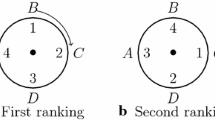Abstract
This paper deals with a proposal by Frederic Schick for resolving Arrow’s dilemma of social choice. Schick challenges Arrow’s assumption that rational social indifference is transitive. It turns out, however, that even if we drop this assumption, we still face a dilemma as embarrassing as Arrow’s. Any constitution which satisfies the remaining conditions is a liberum veto oligarchy. This means a unique set of individuals carries any issue on which it is unanimous, and engenders social indifference on any issue which divides it. A formal statement and proof of this theorem follows an informal presentation of the result.
Similar content being viewed by others
Notes
The symbols \(\supset \), \(\sim \), and \(\cdot \) mean ‘implies’, ‘not’, and ‘and’, respectively.
I was introduced to the idea of dropping transitivity of social indifference from the Arrow conditions by Amartya K. Sen. I originally develeloped this paper in connection with unpublished work by Sen.
Sen has proved this independently, in unpublished work.
The subscript \(y\) on \(\supset \) indicates that the implication holds for all such \(y\).
This expression reads as: the set of all \(x\) such that (a) \(x \in S\) and (b) there does not exist a \(y\) such that \(y \in S\) and \(yP_ix\) for all \(i\). In general, \((i)\) means ‘for all \(i\)’.
It is being implicitly assumed that \(n\) is finite with \(n \ge 2\) and that there are at least three alternatives in \(U\).
Blau’s proof appears in Blau (1956).
It may appear that this proof requires \(U\) to contain at least four alternatives, but this is not the case. The alternatives \(x, y, w\), and \(z\) need not all be distinct.
Here, (i) and (ii) refer to the two parts of the definition of a liberum veto oligarchy.
References
Arrow KJ (1963) Social choice and individual values, 2nd edn. Wiley, New York
Arrow KJ (1967) Values and collective decision-making. In: Laslett P, Runciman WG (eds) Philosophy, politics and society, third series. Basil Blackwell, Oxford, pp 215–232
Schick F (1969) Arrow’s proof and the logic of preference. Philos Sci 36:127–144
References added in 2013
Blau JH (1956) The existence of social welfare functions. Econometrica 25:302–313
Gibbard AF (2014) Social choice and the Arrow conditions. Econ Philos 30, forthcoming (Originally written in December 1968 or January 1969.)
Sen AK (1969) Quasi-transitivity, rational choice and collective decision. Rev Econ Stud 36:381–393
Sen AK (1970) Collective choice and social welfare. Holden-Day, San Francisco
Weymark JA (2014) An introduction to Allan Gibbard’s Harvard seminar paper. Econ Philos 30, forthcoming
Author information
Authors and Affiliations
Corresponding author
Additional information
This paper was written in the 1969–1970 academic year when I was an Assistant Professor of Philosophy at the University of Chicago. It is based on a term paper (Gibbard 2014) that I wrote for the Arrow–Rawls–Sen seminar at Harvard University in the Autumn term of 1968–1969. For a discussion and history of both papers, see Weymark (2014). Numbered footnotes are from the original manuscript. Symbolic footnotes have been added by the Associate Editor, John Weymark. Minor errors have been silently corrected. I am very grateful to John Weymark for arranging for this publication and for his careful editorial work, including his wonderful explanatory notes. I am also grateful to Nicholas Baigent for identifying some of the minor errors alluded to above.
Rights and permissions
About this article
Cite this article
Gibbard, A.F. Intransitive social indifference and the Arrow dilemma. Rev Econ Design 18, 3–10 (2014). https://doi.org/10.1007/s10058-014-0158-1
Published:
Issue Date:
DOI: https://doi.org/10.1007/s10058-014-0158-1




